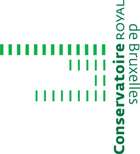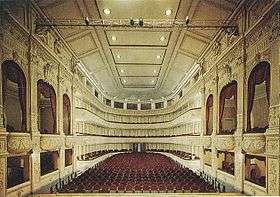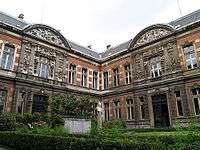Royal Conservatory of Brussels
|
Koninklijk Conservatorium Brussel Conservatoire Royal de Bruxelles | |
|
Royal Conservatory of Brussels | |
| Director |
Peter Swinnen (Flemish entity) Frédéric de Roos (French entity) |
|---|---|
| Location | Brussels, Belgium |
| Website |
www www |
  | |
Starting its activities in 1813, the Royal Conservatory of Brussels (French: Conservatoire royal de Bruxelles, Dutch: Koninklijk Muziekconservatorium) received its official name in 1832. Providing performing music and drama courses, the institution became renowned partly because of the international reputation of its successive directors such as François-Joseph Fétis, François-Auguste Gevaert, Edgar Tinel, Joseph Jongen or Marcel Poot, but more because it has been attended by many of the top musicians, actors and artists in Belgium such as Arthur Grumiaux, José Van Dam, Sigiswald Kuijken, Josse De Pauw, Luk van Mello and Luk De Konink. Adolphe Sax, inventor of the saxophone, also studied at the Brussels Conservatory.
In 1967, the institution split into two separate entities: the Koninklijk Conservatorium Brussel, which teaches in Dutch and English, and the Conservatoire Royal de Bruxelles, which continued teaching in French. The former entity became a School of Arts of Erasmus University College alongside film school RITCS, and associated with Vrije Universiteit Brussel it also offers Ph.D. degrees in the Arts through Art Platform Brussels. Since 2009, the latter entity has been associated with the Ecole Nationale Supérieure des Arts Visuels La Cambre and the Institut National Supérieur des Arts du Spectacle (INSAS), forming ARTes, an organisation that embraces the three aforementioned art schools of the French Community of Belgium in Brussels.
Building
The current Royal Conservatory building consists of three wings arranged around a courtyard and is the work of architect Jean-Pierre Cluysenaer, built to his designs between 1872 and 1876.
The style is neo-Renaissance, influenced by the Lescot Wing of the Louvre. The decorative program of the facade is very elaborate, with five separate pediment sculptures (Instrumental Music by Liège sculptor Adolphe Fassin, Orchestration by Charles van der Stappen, Composition by Antwerp sculptor Frans Deckers, Performing Arts by Antoine-Félix Bouré, and Poetry by Tournai sculptor Barthélemy Frison) and other incidental work including garlands, caryatids, palm trees and musical instruments by sculptors Georges Houtstont, Paul de Vigne, Antoine-Joseph Van Rasbourgh, Auguste Braekevelt, and Égide Mélot.
Auxiliary activities
Concerts
Each year a variety of regular student concerts and performances is organised by the Conservatory, boasting over hundred events and enhanced by two festivals.
The right wing of the Conservatory contains a 600 seats ornate concert hall in Napoleon-III style with exceptional acoustic qualities, equipped with a Cavaillé-Coll organ.

Musical Instrument Museum (MIM)
Founded in 1877 to provide students with a practical education about ancien instruments, the Conservatory museum, currently referred to as the Musical Instrument Museum (MIM) of Brussels displays over 8.000 ancient instruments acquired by Fétis, rare pieces from the initial collection, from the various funds or from new acquisitions. Since 2000, the museum, one of the most important ones of its kind, is located in the prestigious Art Nouveau building conceived in 1899 by the Belgian architect Paul Saintenoy for Old England.
Library
Initially created with a pedagogic aim, the Conservatory library hosts about 250.000 references, representing a scientific instrument of international resonance.

It primarily consists of works about music (including more than 1200 musical or musicological periodicals), as well as of autograph, printed or digitized (scanned) scores. There is also an important collection of more than 8.000 libretti of Italian, French or German operas from the XVIIe and XVIIIe s., lute and guitar tablatures, several thousands of handwritten letters of musicians, iconographic documents (over 9.000 pieces), concert programmes and various types of recordings (magnetic tapes, video, 78 and 33 rpm vinyl, CD, etc.).
Next to the core collections, the library possess several funds of historical importance, together forming an extensive patrimony:
- the Johann J.H. Westphal fund bought by Fétis (manuscripts of C.P.E. Bach and G.P. Telemann),
- the Richard Wagener fund acquired by the librarian Alfred Wotquenne (German music from the XVIIe, XVIIIe and XIXe s. including 40 autograph manuscripts from three sons of J.-S. Bach),
- the Jean-Lucien Hollenfeltz fund (documents of Constance Mozart and her youngest son Franz Xaver Amadeus Mozart),
- the Maria Malibran fund (documents and objects from the cantatrice and her close family),
- the Edmond Michotte fund (pieces from Rossini's private library),
- the Józef Wieniawski fund (autograph scores from the pianist),
- the Laurent Halleux fund,
- the Joseph Jongen fund.
In 2015, the library acquired the score collection of CeBeDeM (Belgian Centre for Music Documentation). In doing so it also took over the latter's objectives in promoting Belgian contemporary music worldwide.
Personalities linked to the Royal Conservatory of Brussels
_(14783631813).jpg)
Directors
- 1833-1871: François-Joseph Fétis
- 1871–1908: François-Auguste Gevaert
- 1908–1912: Edgar Tinel
- 1912–1925: Léon Du Bois (in French)
- 1925–1939: Joseph Jongen
- 1939–1949: Léon Jongen
- 1949–1966: Marcel Poot
Directors of the Conservatoire Royal de Bruxelles
- 1966–1973: Camille Schmit (in French)
- 1974–1987: Éric Feldbusch (in French)
- 1987–2002: Jean Baily (in French)
- 2003–present: Frédéric de Roos
Directors of the Koninklijk Conservatorium Brussel
- 1966-1994: Kamiel D'Hooghe (in Dutch)
- 1994-2004: Arie Van Lysebeth (in Dutch)
- 2004-2008: Rafael D'Haene
- 2008–present: Peter Swinnen
Notable faculty
- Daniel Blumenthal (piano)
- Boyan Vodenitcharov (piano)
- Igor Oistrach (violin)
- Barthold Kuijken (baroque)
- Katarina Glowicka, computer music
- Luc Devos (piano)
- Jan Michiels (piano)
- Lola Bobesco (violin)
- Yossif Ivanov (violin)
- Adrien François Servais (cello)
- Paul Dombrecht (hobo)
- Philippe Pierlot (baroque)
- Norbert Nozy (brass band)
- André Souris (direction, composition)
- Jacques Leduc (direction, composition)
- Charles-Auguste de Bériot, violin
- François Daneels, saxophone
- Bernard Foccroule, organ
- Julien Ghyoros, direction
- Jacques-Nicolas Lemmens, organ
- Jean Louël, piano
- Marie Pleyel, piano
- Eliane Reyes, piano
- Adolphe Samuel, composition
- Henri Vieuxtemps, violin
- Henryk Wieniawski, violin
- Eugène Ysaÿe, violin
- Zygmund Kowalsky (violin)
- Yuzuko Horigome (violin)
- Valery Oistrach (violin)
- Viviane Spanoghe (chamber music)
- Erik Robberecht (chamber music)
- Alain Gervreau (baroque)
- François Fernandez (baroque)
- Bart Coen (baroque)
- Bruno Castellucci, jazz percussion
- Ernest Van Dijck, lyrical art
- Jules Zarembski, piano
Notable alumni
- Elie Apper
- Isaac Albéniz
- Peter Benoit
- Oskar Back
- Fabrizio Cassol
- Alain Crépin
- François Daneels
- John Giordano
- Edwin Grasse
- Mansoor Hosseini
- Désiré Magnus
- Alma Moodie
- Norbert H. J. Nozy
- Gianfranco Pappalardo Fiumara
- André Rieu
- Noël Samyn (fr)
- Adolphe Sax
- José van Dam
- Eugène Ysaÿe
- Carl Verbraeken
- Alfred Wotquenne
External links
| Wikimedia Commons has media related to Royal Conservatory of Brussels. |
- Koninklijk Conservatorium Brussel (English)
- Conservatoire Royal de Bruxelles (French)
- Erasmus University College
- Arts Platform Brussels
- http://www.lacambre.be
- http://www.insas.be
- Royal Conservatory of Brussels library catalog
- CeBeDeM
Coordinates: 50°50′20″N 4°21′21″E / 50.8390°N 4.3558°E
